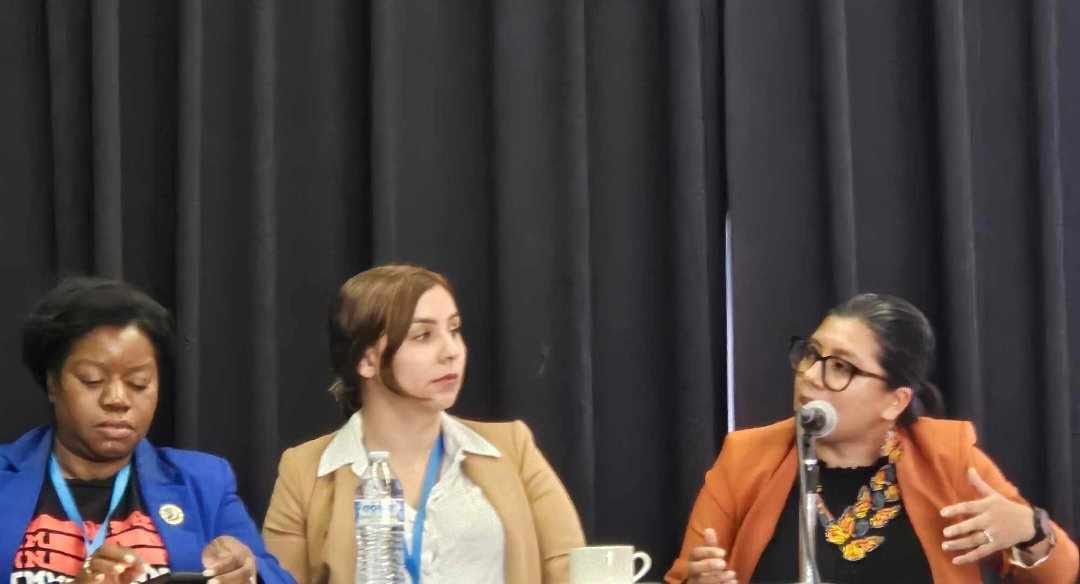[ printer-friendly
PDF version ]
Rhetoric indicates growing awareness of grassroots resistance
Regional Leaders Gather in Merida
to Advance PPP
by Jonathan Treat | July 24, 2002
When the presidents of the seven Central American countries and Mexico met June 28 and 29 to discuss concrete ways that their Plan Puebla-Panama (PPP) can further Meso-America’s integration into the global marketplace, they sought to soften controversy swirling around the scheme.
Mexican President Vicente Fox, in language befitting his stature as a former Coca Cola executive, billed the summit in Merida, Mexico, as “two days of great promotion of the region on a world scale.”
This optimistic presentation of Fox’s pet development project ignored a message sent to the Merida meeting by hundreds of civic organizations that parleyed in Quetzaltenango, Guatemala, two days before the summit.
“The PPP is not going to work and it will bring tragic consequences to the region,” said the declaration by 500 representatives of organized civil society from 15 nations who held the Second Week for Biological and Cultural Biodiversity on June 26.
The Mexican president’s mega-development plan was agreed to a year ago by Central American heads of state who have been holding meetings with Mexico about trade liberalization since 1991 in the forum dubbed the Tuxtla mechanism. PPP is their most ambitious effort, featuring massive public and private investment in transportation and energy infrastructure projects to fill gaps in global land and sea shipping routes and to support major industrialization of the region, which includes Mexico’s nine southernmost states.
In conjunction with the summit, more than 1,000 representatives of roughly 800 companies–mostly multi-nationals–from Latin America, the United States, Europe, and Asia participated in the Investment Expo trade show. Aimed at connecting PPP and related projects with businessmen and financiers, it touted ample investment opportunities in the region for gas and electric systems, highways, ports, telecommunications, airports, railway lines, and tourism.
Making Headway on Roads, Electricity
The most tangible outcomes of the event in Merida were the signing of an agreement to move forward with major highway projects along both coasts from southern Mexico to Panama and the unveiling of a new piece of the program to link up electric grids throughout the region. Those two achievements were enough to cause Fox to term the summit a success.
“It is not now the Puebla-Panama plan. It’s now a reality underway.” Fox said. [ 1]
The PPP is currently the top priority in the region for Inter-American Development Bank (IDB), which has offered an initial $4 billion line of credit for infrastructure.
With that backing and other public funding sources, the presidents signed an agreement for major road building and improvement projects totaling some 7,500 kilometers (4,500 miles) to contribute to the so-called International Network of Meso-American Highways, which carries a price tag of $3.5 billion. Construction has already begun on the Pacific Coast highway system, and Caribbean Coast road work is scheduled to follow.
The network’s cost is part of an estimated $5.5 billion needed to carry out current PPP-related infrastructure projects. Of that, $1.5 billion worth is designated for Mexico, and the rest is for Central American countries. Long-term spending projections are, of course, much higher: $20 billion over the anticipated 25-year lifespan of the PPP.
The region’s governments have pledged roughly $672 million for the highway projects so far. Enrique Iglesias, president of the IDB, has recommended that the governments also auction concessions to private companies for some of the roads.
The second major outcome o the Merida summit, announced by Fox’s PPP Coordinator Florencio Salazar, was the approval of a project to connect electric grids from Panama north to Guatemala. The power infrastructure linkage is set to be completed this year.
The project calls for eventually expanding the linkage to Belize, then on to Mexico. The Spanish power company Edesa has committed $70 million to the project, the first private funds promised for electric grid construction. The project is scheduled for completion in 2003 at a total of $320 million, much of which is also to be financed with soft loans from the IDB.
The announcement follows another made by the IDB in December, stating that Mexican and Guatemalan officials had agreed to cooperate on a complementary $30 million project to build a transmission line between Tapacula, Mexico, and Los Brillantes, Guatemala.
Social Concerns Take Backseat
While goals for the first phases of PPP were clear during the summit–improving highways and creating a regional power grid, as well as softening customs and tariff policies–the purported next steps are much less so. Plans heralded by Fox during the summit for the development of education systems, sustainable tourism, environmental protection, indigenous rights, and cooperation in disaster relief remain nebulous.
“To the best of my knowledge, there is no proposal, token or otherwise, to incorporate special measures like education, health programs, etc., into the framework of the PPP,” says Ryan Zinn, researcher and coordinator of Global Exchange’s Chiapas program. “Salazar and Fox and others are operating form the assumption that private investment, which in turn creates employment, will eventually provide these services. However, nowhere has this ever worked out. It is simply rhetoric.”
Official documents show that some 80% of the PPP budget is earmarked for highway, seaport, or other infrastructure development.
The documents clearly reveal three primary goals. First, and evident in the Merida summit, is the development of the transportation and energy infrastructure to welcome export industries. Next, a strategy to stimulate a shift from a traditional, agriculture-based economy to one fueled by maquiladoras, or foreign-owned export manufacturers. Finally, and critical to the PPP, is the expansion of private control over the region’s land and vast natural resources.
Neoliberal economists and multinational marketeers see these goals as inevitable, if not laudable, in the expanding global economy.
Another goal of PPP, admitted by Salazar and other proponents, is to stem the flow of migrants to the United States.
In spite of the Merida summit’s upbeat tenor at the announcement of the highway and electric projects already or soon to be underway, hints of trouble in development paradise prompted authorities to craft their rhetoric accordingly.
The Quetzaltenango NGO confab was among several convened recently by groups–a trend that reveals strong and growing opposition to the Plan Puebla-Panama in Mexico and Central America. “Forums where governments shut themselves in to plan and decide the lives of millions of indigenous and peasants are not the way to achieve true development, rather [they should be] listening to the position of native peoples,” attendees at the Quetzaltenango event declared in a public statement.
In another example, indigenous leaders from nine countries, with UN and IDB support, submitted a 10-point list of demands to the summit, calling for a commissioner and funding to assure their agenda would be respected in further implementation of PPP.
Another group of 40 indigenous and nongovernmental organizations from a dozen Mexican states at an Encounter in Defense of Traditional Medicine a week before the summit signed a declaration calling for limiting the PPP’s reach to avoid “plundering the nation’s resources” and further impoverishing the already poor.
Many regional leaders, including Salazar, adopted a pro-active approach to criticism and often seized on the buzz word “sustainable” in describing the type of development envisioned in the PPP.
“We are looking for sustainable progress, that will give us development based on sustainability,” Salazar said. [ 2]
He echoed the recommendations of regional leaders attending the Merida conference, saying that PPP coordinators should consult directly with indigenous communities “to determine their concerns and fears.” [ 3]
Mexico’s deputy foreign minister highlighted the need for PPP coordinators to take pains to inform the public about the goals and suggested that a lack of information has created some uncertainty about the main goal of PPP–sustainable economic development for the good of the region. [ 4]
But many critics argue that the planned development of an industrial corridor of export assembly plants in southern Mexico is clearly not environmentally–or economically–sustainable.
Ulterior Motives
Critics point out that, in spite of the PPP’s supposed good intentions of economic development, jobs, and increased standards of living for the region’s 64 million impoverished citizens, the plan is actually motivated by the proposed Free Trade Area of the Americas and other goals.
“Generally speaking, the PPP is NAFTA [the North American Free Trade Agreement]–without the token, phantom environmental and labor side agreements. The goal is to attract foreign, private capital at any cost,” Zinn explained.
Skeptics warn the megaproject will open the region’s natural resources to vast exploitation by multinationals, encourage rampant environmental destruction of its rich biodiversity, trample on the rights of indigenous peoples, and dislocate communities. They argue that the only jobs created will be low-paying factory jobs vulnerable to flight to still more desperate populations.
Fox has been strong in deflecting criticism that the PPP will bulldoze environmental and indigenous rights. In Merida he insisted that complete respect for natural resources and native peoples is “a fundamental point” of the project and said that any community can choose not to participate.
“Nobody is imposing anything,” he said. “This is absolutely not a straightjacket for anybody.” [ 5]
But throughout the region, trade liberalization policies already have set the scene for forced acceptance by reducing the ability of indigenous communities to sustain themselves through farming and leaving people with few options, Zinn said.
“Agriculture is no longer viable for most indigenous and other campesinos. Their ability to survive in the Mexican countryside has been seriously undermined via the dismantling of the agricultural sector, flooding of the market with cheap basic grains, such as corn, and eliminating price supports in sectors like coffee,” Zinn explained. “Then the government and/or friendly neighborhood maquiladora comes in with the option for salvation: employment in the export processing zone.”
Regarding Fox’s assertion that respect for indigenous rights is central to PPP, Zinn acknowledged that “in theory,” the PPP proposals must be opened for consultation with communities affected as “mandated by the IDB, the World Bank, and as part of the government’s strategy to legitimize its projects.” But, he added, “In reality they have no clue about the demands or needs of the communities… . The long and short: Nowhere in the PPP are there any guarantees for indigenous peoples, the environment, labor rights, etc.”
The conciliatory tone used in addressing criticism of the PPP that Salazar and others showed during the Merida summit was quite different from other occasions.
Even up to two days before the summit, Salazar responded to critics of PPP by saying the plan is not one of “savage capitalism.” He denounced as “lies” evidence that the PPP was widely opposed by indigenous groups who argue that the development project would have a devastating effect on the environment and on their communities.
Although Salazar acknowledged some popular resistance to the plan, he said those in opposition are poorly informed, or “people who are well-informed but hold an ideological bent opposed to the project,” using the EZLN as an example. [ 6]
But Salazar’s assertion of a limited, uninformed, or strictly ideologically based resistance to the PPP is inaccurate, say observers, pointing to the dozens of publicly organized meetings on the PPP convened in recent months.
Public Pressure Building
Hundreds of organizations representing thousands of people in the region have mobilized in opposition to PPP in its brief year of existence. At a November summit in Guatemala, civil organizations in the region worked on creating an alternative Mesoamerican integration plan “elaborated by the people, to achieve sustainable development that is inclusive, fair, and democratic, and recognizes plurality and diversity.”
A regional meeting of the Network of Response and Resistance to the Plan Puebla-Panama was convened in Orizaba, Mexico in February.
Civil society organizations from Mexico, Guatemala, and El Salvador held another session on the PPP this spring in Tapachula. And more than 800 met in Managua, Nicaragua in late July for an international forum on the plan.
Throughout Mexico and Central America, community organizations have used local media, created web sites, given workshops, and organized conferences to educate thousands about the implications of the PPP, explore resistance strategies and alternative development models, and demand public hearings with all communities to be affected by PPP projects. Additionally, a number of regional organizations have formed coalitions with groups in the United States and Europe to educate and mobilize cross-border resistance to PPP.
In a speech the opening night of the PPP summit in Merida, Inter-American Development Bank President Iglesias acknowledged concerns over the PPP’s threat to the environment and to indigenous rights, but he said the region’s integration into the global economy is inevitable.
“I also believe there are reasons to worry, because those potential threats are real,” Iglesias said. He added, however, that “[if] integration was an objective in the past, today it is imperative. Today it is destiny.” [ 7]
If integration is destiny, all the same, hundreds of civil organizations representing thousands of people in the region have mobilized to shape that destiny and determine what form, if any, their communities’ insertion into the global economy will take.
“I would say that the overall opposition to the PPP is widespread, strong, and potentially the single unifying force not only among diverse environmental, indigenous, union, [and] national movements, but regionally as well,” said Zinn. “Cross-border organizing throughout Meso-America has never been as strong and coordinated as it is now.”
Jonathan Treat, a journalist and independent documentary filmmaker with extensive experience in Mexico and Central America, writes regularly for the IRC’s America’s Program. Based in Oaxaca, Mexico, Treat also coordinates educational study tours and volunteer opportunities in the region for U.S. students.
* Look for a pending Americas Program Citizen Action in the Americas profile of the social movement organizing to counter the PPP on our Citizen Action page soon.
Join our network to receive email announcements that tell you when new items like this article are posted to the Americas Program website. Information on our privacy policy is available on our network sign-up page.
For more information:
“Sin beneficio para los pueblos, el Plan Puebla-Panama” | La Jornada , June 28, 2002
http://www.jornada.unam.mx/2002/jun02/020628/007n3pol.php?origen=index.html
“Last Harvest? Industrialization plan threatens Central America’s indigenous” | Resource Center of the Americas, May 1 2002
https://www.americas.org/News/Features/200205_Puebla_Panama_Plan/20020501_index.htm
“Plan Puebla-Panama: Done Deal or Emerging Flashpoint?” | Americas Program, April 9, 2002
http://www.americaspolicy.org/articles/2002/0204puebla.html
“Developers Hitch Hopes to PPP | Americas Program, April 10, 2002
http://www.americaspolicy.org/articles/2002/0204transport.html
“Farms vs. Factories” | The Texas Observer , Feb. 1, 2002
http://www.texasobserver.org/showArticle.asp?ArticleFileName=020201_f3.htm
“Development in Mexico” | Americas Program, October 2001
http://www.americaspolicy.org/reports/2001/bl82.html
“Fox Strives to Spread Maquiladoras South” | borderlines UPDATER , August 7, 2001
http://www.us-mex.org/borderlines/updater/2001/aug7ppp.html#fox
“PPP Plays into Washington’s Hand for Latin America” | borderlines UPDATER , August 7, 2001
http://www.us-mex.org/borderlines/updater/2001/aug7ppp.html#ppp
Notes:
[1] John Rice, Associated Press, June 27, 2002]
[2] Hernan Guerra, El Periodico, Guatemala, April 29, 2002.
[3] Edgar Hernandez, EFE, June 30, 2002.
[4] Edgar Hernandez, EFE, June 30, 2002.
[5] John Rice, Associated Press, June 27, 2002]
[6] Edgar Hernandez, EFE, June 26, 2002.
[7] [Ginger Thompson, New York Times, June 29, 2002.
Published by the Americas
Program at the Interhemispheric Resource Center (IRC). ©2002. All
rights reserved.
Recommended citation:
Jonathan Treat, “Plan Puebla-Panama’s Merida Summit,” Americas Program (Silver City, NM: Interhemispheric Resource Center, July 24, 2002).
Web location:
http://www.americaspolicy.org/articles/2002/0207ppp .html



